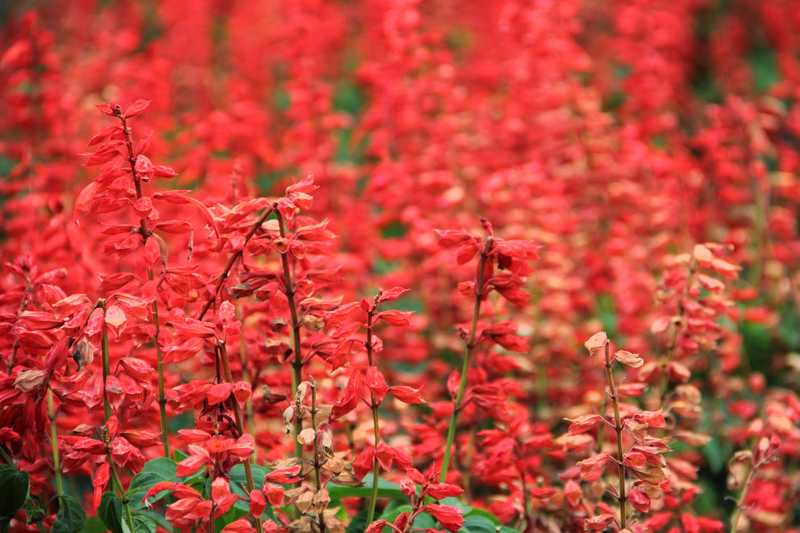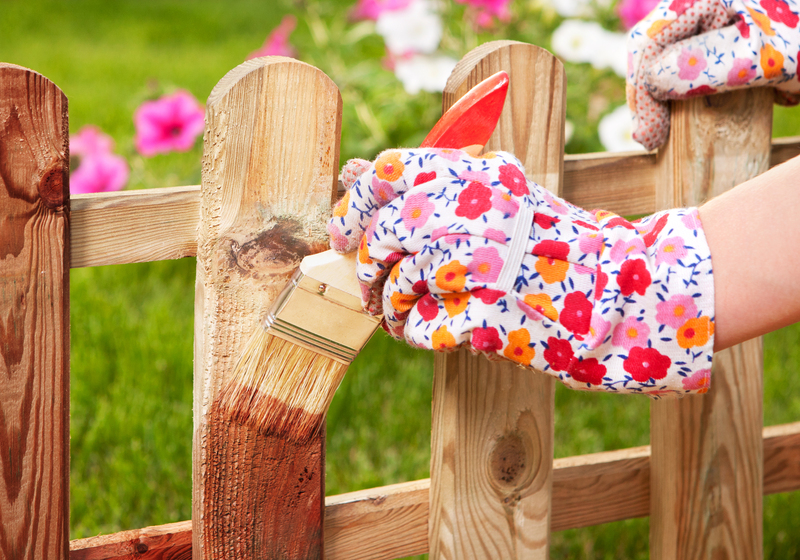Essential tips for budding gardeners: 9 ways to succeed
Posted on 19/09/2025
Essential Tips for Budding Gardeners: 9 Ways to Succeed
Are you eager to cultivate your own lush, vibrant garden but not sure where to start? Whether you're dreaming of a flourishing flower bed, a fruitful vegetable patch, or a charming collection of potted plants, knowing where to begin can be overwhelming. Fortunately, with the right knowledge and a touch of patience, every new gardener can grow into a seasoned enthusiast. In this article, we'll reveal 9 proven tips for novice gardeners that will guide you towards a thriving, beautiful garden. Get ready to put on your gloves and dig into essential gardening success strategies!
1. Get to Know Your Garden
Before you plant a single seed, it's crucial to understand your garden's unique characteristics. Every outdoor space is different, and recognizing these elements will set the foundation for gardening triumph.
- Sunlight: Observe how sunlight moves across your garden during the day. Identify full sun, partial shade, and full shade areas. Most vegetables and flowers need at least 6 hours of sun daily.
- Soil Type: Is your soil sandy, clay-heavy, or loamy? Conduct a simple soil test to check pH and fertility. Healthy soil = flourishing plants.
- Drainage: After rainfall, notice where water collects. Poor drainage leads to root rot, so choose well-drained spots for sensitive plants or amend heavy soil with organic matter.
Properly assessing your garden is the first step towards becoming a successful beginner gardener.

2. Start Small and Simple
Many beginner gardeners make the mistake of biting off more than they can chew. Excitement is fantastic, but a manageable approach prevents disappointment.
Why Keep It Simple?
- Less Overwhelm: A small plot or a few containers are easier to manage and maintain.
- Lower Costs: Fewer seeds, plants, and supplies mean minimal upfront investment.
- More Learning: You can focus on mastering watering, pruning, and pest control techniques for a small space.
Tip: For your first season, consider starting with container gardening on a balcony, patio, or windowsill. Herbs, lettuce, and radishes are fast-growing, beginner-friendly choices.
3. Choose the Right Plants
The secret to gardening for beginners often comes down to plant selection. Picking the right varieties ensures a higher success rate, even if you lack experience.
- Native Plants: These species are naturally adapted to your local climate and require less maintenance, water, and pest control.
- Easy-to-Grow Plants: Sunflowers, marigolds, basil, tomatoes, and zinnias are low-maintenance favorites for budding gardeners.
- Consider Your Goals: Do you want colorful blooms, fresh veggies, or fragrant herbs? Make choices that reflect your interests.
Read plant tags or seed packets for specific sunlight and care requirements before purchasing.
4. Prioritize Soil Health
If you dream of abundant harvests and thriving blooms, soil is your garden's foundation. Don't neglect this fundamental element of gardening for success.
Secrets to Happy Soil:
- Compost: Add compost or well-rotted manure to enrich undernourished soil. Making your own compost recycles kitchen and garden waste.
- Mulch: Spread organic mulch (like bark, straw, or leaf mold) to suppress weeds, conserve moisture, and moderate soil temperature.
- Loosen and Aerate: Use a garden fork or spade to break up compacted soil, allowing roots to penetrate deeply.
Healthy soil = healthy plants. Invest time in amending and feeding your earth before planting and throughout the growing season.
5. Master Watering Techniques
Water is essential, but too much--or too little--can spell disaster. Understanding best watering practices guarantees robust roots and vigorous growth for every beginner gardener.
- Water Morning or Evening: Prevent foliage from staying damp (which encourages fungal disease) by watering early or late in the day.
- Soak the Roots: It's better to water deeply and less often, encouraging deep root systems instead of shallow surface roots.
- Check Soil Moisture: Stick your finger in the soil; if the top inch is dry, it's time to water.
Remember, different plants have different hydration needs. Adjust frequency for seedlings, established plants, and drought-tolerant species.
6. Feed Your Plants the Right Way
Like any living thing, plants need balanced nutrition to thrive. As a beginner, avoid common fertilizing mistakes and learn to meet your plants' dietary needs.
- Use Organic Fertilizers: Compost, fish emulsion, bone meal, and seaweed extracts provide gentle, slow-release nutrients.
- Follow Instructions: More is not better! Over-fertilizing can burn roots or disrupt soil biology. Always read label directions.
- Feed at the Right Time: Annuals and vegetables benefit most from fertilizing at planting and during peak growing periods.
Healthy, well-fed plants resist pests and diseases more effectively, boosting your confidence as a green-thumbed gardener.
7. Learn Basic Pest and Disease Control
No matter how attentive you are, pests and diseases are inevitable visitors to every garden. For gardening newbies, it pays to know efficient, eco-friendly control methods.
Pest and Disease Management Essentials:
- Inspect Regularly: Check the undersides of leaves for pests, eggs, or signs of disease.
- Encourage Beneficial Insects: Ladybugs, lacewings, and bees are natural allies. Avoid harsh chemicals that may harm helpful wildlife.
- Act Quickly: Remove affected leaves, hand-pick pests, or use organic sprays (like neem oil) before problems escalate.
- Practice Crop Rotation: In veggie beds, avoid planting the same species in the same spot year after year. This minimizes pest and disease build-up.
Learning to spot trouble early is key for growers at every level--but especially for those new to gardening and looking for success.
8. Regular Maintenance and Record Keeping
Professional gardeners know that steady, small efforts pay off the most. Routine garden care helps prevent problems before they begin.
- Weed Often: Nip weeds in the bud for happy, healthy plants and reduced competition for resources.
- Prune and Deadhead: Trim dead or overgrown branches and remove spent flowers to promote fresh growth and blooming.
- Clean Up Debris: Clear fallen leaves and stems that can harbor pests or diseases.
- Keep a Garden Diary: Record planting dates, varieties, weather, successes, and failures. This invaluable habit helps you plan future improvements.
Consistency is your friend! Even a few minutes each day can make your plot the pride of the neighborhood.
9. Keep Learning and Embrace Mistakes
Every expert gardener was once a beginner. Be patient and remember that gardening is a journey, not a destination.
- Join Local Garden Groups: Ask questions, share experiences, and tap into a treasure-trove of wisdom from your community.
- Explore Books and Online Resources: There are countless gardening blogs, YouTube channels, and apps to guide you.
- Experiment Fearlessly: Not every plant will flourish. Use setbacks as valuable lessons to refine your approach next season.
Boldly try new techniques and celebrate every sprout, blossom, or harvest--no matter how small. The best gardens are grown with both patience and passion!
Bonus Tips for Aspiring Gardeners!
- Protect Your Back: Use ergonomic tools or a kneeling pad--gardening should be fun, not painful.
- Label Everything: Plant markers help you remember what, and where, you planted.
- Practice Sustainability: Collect rainwater, reuse containers, and compost to create an eco-friendly garden haven.
- Celebrate Your Progress: Take photos throughout the seasons to see how far you've come (and share your successes with friends!).

Frequently Asked Questions about Gardening for Beginners
What are the easiest plants for first-time gardeners?
Leafy greens (like lettuce and spinach), herbs (basil, mint, chives), sunflowers, zinnias, and marigolds are reliable, quick to grow, and forgiving for beginners.
How can I improve my garden soil naturally?
Composting, mulching, rotating crops, and avoiding chemical fertilizers will steadily build rich, nourished soil teeming with life.
How often should I water my new garden?
It depends on the weather, plant type, and soil. In general, water deeply 1-2 times per week, but more often for seedlings or in hot/dry conditions. Check soil moisture before watering.
What's the best advice for succeeding in gardening?
Start small, stay curious, and enjoy the process. Accept that occasional setbacks are part of growing as a gardener. With patience and love, your green space will flourish!
Final Thoughts: Your Gardening Journey Begins Now!
Whether you crave a bounty of homegrown vegetables, a yard ablaze with seasonal color, or simply a sunny spot for reading among the bees, gardening is a rewarding hobby for all. By applying these 9 essential tips for budding gardeners, you'll avoid common pitfalls and build a solid foundation for future growth. Remember, every thriving garden started with a single seed and the willingness to learn.
Breathe in the fresh air, get your hands a little dirty, and enjoy every moment of your green-fingered adventure!
Happy gardening, and may your first season be filled with growth, joy, and success!
Latest Posts
Preparedness in Bloom: Shielding Gardens from Severe Weather
Cultivate your herb garden for savory and sweet experiences
Essential tips for budding gardeners: 9 ways to succeed
Materials and Design Tips for a Kid-Centric Garden
Green Fingers Redefined: The Modern Art of Container Gardening

